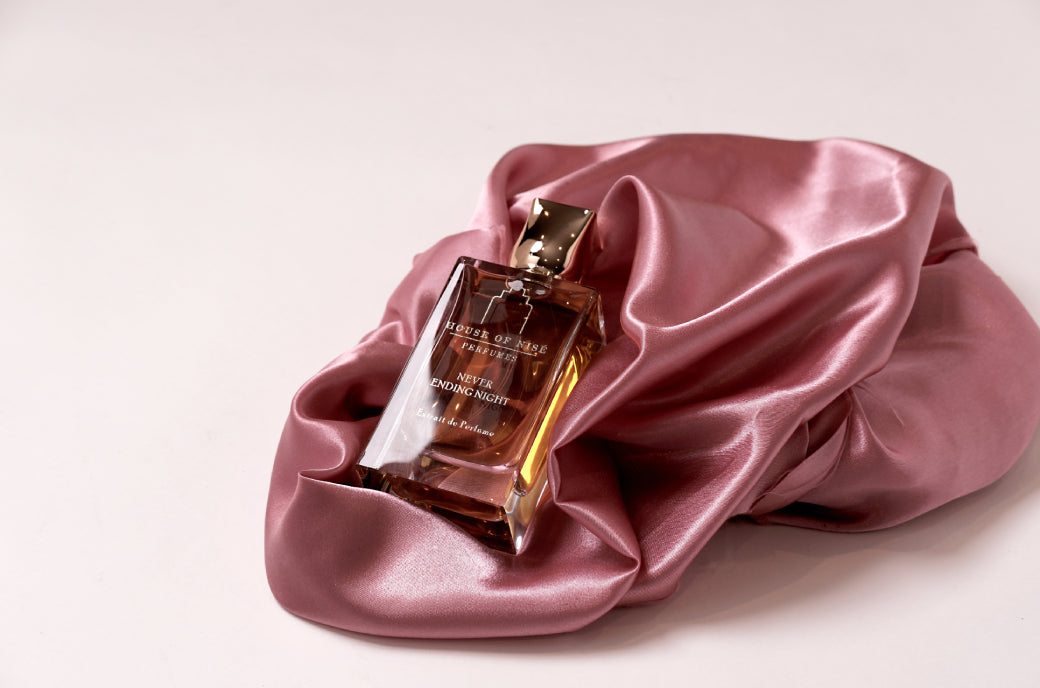Share
What is Perfume Oil?

Perfume oil is the purest and most concentrated form of fragrance. Perfume oil consists primarily of aromatic compounds. These oils are extracted from natural sources such as flowers, herbs, spices, and woods, or they can be crafted synthetically to replicate specific scents.
Perfume oil serves as the fundamental building block of any perfume. It is the concentrated essence that determines the fragrance's character, longevity, and projection. When a perfumer designs a scent, they start with the raw materials and the oil—layering various notes to craft a harmonious composition. This oil is then diluted with alcohol or other carriers to create the final product you spray on your skin. Without perfume oil, the perfume as we know it simply wouldn't exist.
Perfume oils act as the heart and soul of every fragrance. Perfumers blend oils into three distinct categories—top notes, heart notes, and base notes—to create depth and complexity of the scent:
Top Notes: These are the first impressions and the first smell of the perfume
Heart Notes: These emerge as the top notes fade, providing the body of the fragrance
Base Notes: The final layer, often rich and grounding, giving the perfume its staying power.
Eau de Toilette vs. Eau de Parfum vs. Extrait de Parfum
Once the composition of the perfume oil is perfected, the perfume oil is diluted to create different concentrations like Eau de Parfum (15-20% oil) or Eau de Toilette (5-15% oil). The higher the percentage of oil, the stronger and longer-lasting the fragrance. At House of Nisé we choose to work only with Extrait de Parfum (20-40% oil), where we always use 30% oil or more.
Benefits of Perfume Oil
Longevity
Perfume oil has a denser consistency and bonds more effectively with the skin compared to alcohol-based perfumes. Being oil-based, it absorbs gradually into the skin, allowing the fragrance to last longer and unfold elegantly over time.
Gentle on the Skin
Many people prefer perfume oils because they are less likely to irritate the skin
Richness of Scent
The concentrated nature of perfume oil ensures a richer and more vibrant olfactory experience. It captures the true essence of a fragrance without the interference of alcohol, allowing the scent to remain authentic and full-bodied. Although the scent is more concentrated when applied with our roll-on, this method of perfuming offers a more personal and intimate experience.
How to Use Perfume Oil: Application tips and techniques
Use the Roll-On Sparingly
Perfume oil is highly concentrated, so you only need a small amount. Gently roll or dab a drop onto your skin without overapplying.
Warm It Up
After applying, very lightly rub your wrists together or tap the applied area to help warm the oil. This helps the fragrance blend with your natural body chemistry.
Avoid Rubbing Too Hard
Rubbing too aggressively can break down the scent molecules and alter the fragrance. Be gentle to preserve the integrity of the scent.
Apply to Clean, Moisturized Skin
Perfume oil adheres best to hydrated skin. Apply after showering and moisturizing for enhanced longevity and projection.
How to Use Perfume Oil: Best places to apply perfume oil for long-lasting scent
Perfume oil works best on pulse points—areas where your body emits heat, helping to amplify the scent. Key spots include:
Wrists: A classic choice, perfect for discreet application.
Behind the Ears: A subtle spot that releases fragrance as you move.
Neck: Especially at the base, for an alluring aura.
Collarbones: Great for creating a light, intimate trail.
Inner Elbows: Perfect for a soft yet noticeable diffusion of scent.
FAQs
How are perfume oils different from traditional perfumes?
Perfume oils are more concentrated and do not contain alcohol, unlike traditional perfumes which are often diluted with ethanol and water. This makes perfume oils gentler on the skin and more long-lasting. While traditional perfumes are sprayed for a more expansive scent projection, perfume oils are applied directly for a more intimate and personal fragrance experience.
How long does perfume oil last on the skin?
Perfume oils can last anywhere from 6 to 12 hours, depending on factors like skin type, body temperature, and the specific fragrance composition. Their oil-based nature helps them adhere better to the skin, allowing the scent to evolve and linger throughout the day.
Can I layer different perfume oils?
Absolutely! Layering perfume oils is a fantastic way to create a unique, customized fragrance. Apply each oil to different pulse points or let one settle before adding another to the same spot.
Are perfume oils suitable for all skin types?
Yes, perfume oils are generally suitable for all skin types. They are often less irritating than alcohol-based perfumes, making them a great choice for sensitive or dry skin. However, if you have very sensitive skin, it’s always a good idea to patch-test a small amount before full application.
Do perfume oils change scent over time?
Perfume oils can subtly change as they interact with your body chemistry. Factors like your skin's pH, temperature, and even diet can influence how the scent develops. However, their oil-based formula ensures they remain more stable and true to their original composition compared to alcohol-based perfumes.
Are there any precautions I should take when using perfume oils?
Avoid overapplication: Perfume oils are highly concentrated—a little goes a long way. Overapplying can make the scent overpowering.
Keep away from eyes and broken skin: Avoid applying near sensitive areas or open wounds.
Store properly: Keep your perfume oil in a cool, dark place to preserve its quality and prevent the scent from degrading over time.
